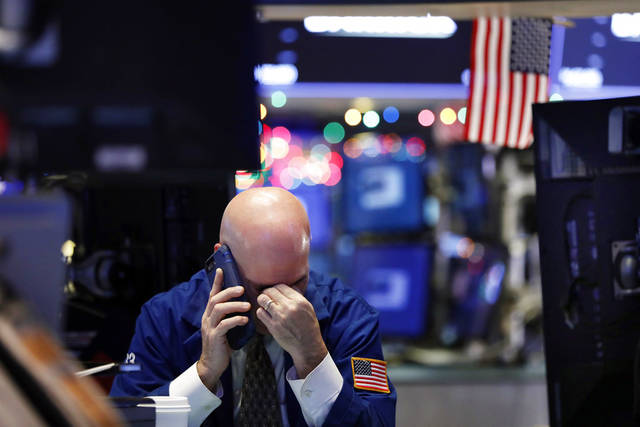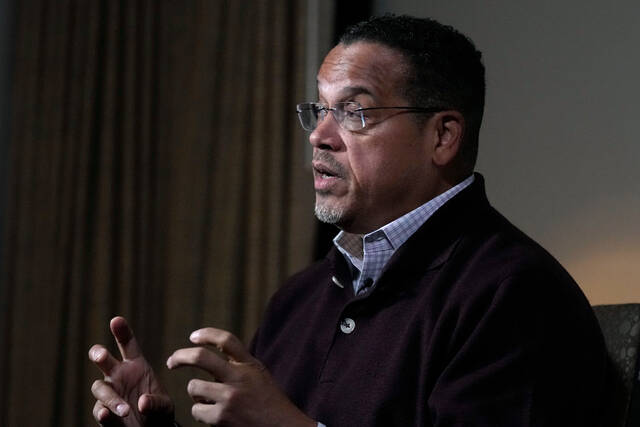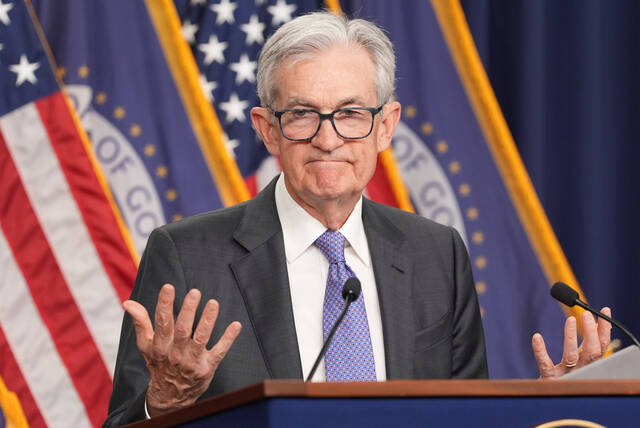Global markets went into a steep decline out of the gate on Wednesday, then seesawed as the volatility of 2018 continued into the new year.
The Dow Jones industrial average swung between being down nearly 400 points and up 86 points, before closing up 18 points, or .08 percent, finishing at 23,345.
The S&P closed at 2,510, up 3 points or .13 percent. The Nasdaq finished at 6,665, up 30 points, or .46 percent. It was the tech-heavy Nasdaq’s fifth consecutive positive close.
President Trump told reporters Wednesday that the stock market’s poor performance last year was a “glitch” that will be reversed after he completes new trade deals this year.
Trump during his first 18 months hailed stock gains as a signature accomplishment of his administration. He has blamed the stock market’s tumble in the final quarter of 2018 on the Federal Reserve.
Wednesday’s turbulence was attributed to the release of new manufacturing data from China indicating a slowdown. But many investors cited the Trump trade war with China and his administration’s unpredictability as causes of the decline over the last few months.
“China came out with a weak manufacturing number,” said Kenny Polcari of Butcher Joseph Asset Management. But he suggested Wednesday’s bumps would put pressure on Trump to resolve the trade dispute.
“This is going to force the Trump administration to the realization that they need to make a trade deal sooner rather than later. If the data is weak now, it’s only going to get worse as the negotiations drag on,” Polcari said.
The U.S. economy is strong, with unemployment at a nearly 50-year low and interest rates still cheap by historical standards, even after nine Federal Reserve interest rate increases since December of 2015.
Retailers reported a robust holiday season and corporate earnings are expected to be healthy when companies begin reporting later this month.
Most Wall Street watchers do not see a recession on the horizon, but many see a 2019 economy that is less robust than last year. There are some signs that the Fed may halt or even reverse the interest rate hikes to ensure a soft landing for the economy.
“I do not expect the Fed to cut rates this year,” said Kristina Hooper, chief global market strategist at Invesco. She predicts one or two rate hikes unless there is a significant change in the economy.
“The Fed could hit the ‘pause button’ at some point,” Hooper said. “But conditions would have to change dramatically.”
The closely watched yield on the 10-year Treasury bond has dropped below 3 percent, a signal that investors are concerned about the long-term health of the economy.
Ivan Feinseth of Tigress Financial Partners said “a cut would be confirmation that the economy is slowing and that the Fed went one rate increase too far. Higher interest rates are a sign of a strong economy. Many economic indicators, while off their all-time highs, are still elevated.”
Asian markets were hit hard in overnight trading, with Hong Kong’s Hang Seng Index down 2.77 percent, the Shanghai composite dropping 1.15 percent and Japan’s Nikkei 225 losing 0.31 percent.
Britain’s FTSE 100 and the German DAX were both barely in the positive column. The European Stoxx 600 was down only .13 percent and the French CAC 40 fell. 87 percent.
The energy sector was one of the best performers Wednesday as oil prices regained some upward momentum. U.S. supermajors Chevron and Exxon Mobil both advanced on the upward shot of oil prices.
Oil bounced on reports that Saudi Arabia, the de facto leader of the Organization of the Oil Exporting Counties, was standing by its pledge to pump less oil. West Texas Intermediate jumped to $46.48 per barrel, nearly 2.5 percent. Benchmark Brent Crude rose to nearly $55, or above 2 percent.
“The data from Saudi Arabia is that they are cutting exports and are serious about it,” said John Kilduff of Again Capital. “The oil market has been waiting for some concrete efforts on Saudi Arabia’s part, and this is one of them.
“My thesis is that the Saudis are going to put their shoulder to the wheel and do several things to tighten the global supply picture,” Kilduff said. “That should get prices back higher.”
Wednesday’s losses followed a down 2018 for stocks, the worst in a decade. All three major indexes finished 2018 in the red after a tumultuous year.
The Dow Jones industrial average finished 5.6 percent down and the S&P 500 finished 6.2 percent down for 2018. The tech-heavy Nasdaq composite finished the year at a 3.9 percent loss.
Wednesday’s global pullback came after a private sector survey indicated that China’s manufacturing was contracting for the first time in 19 months. The private report follows release of official data last week that reflected weakness in the Chinese factory sector.
“The stock market should be up, not down on weak Chinese economic indicators,” said Ed Yardeni, president of Yardeni Research. “The data puts a lot of pressure on the Chinese to make a deal with President Trump on trade.”
China is much more dependent on the U.S. market to buy its goods. Exports from the U.S. to China represent only 7.8 percent of total U.S. exports, Yardeni said.
Yardeni said the Chinese economy is suffering from insufficient domestic demand, which makes their $500 billion in exports to the U.S. critical to their economic health.
“The Chinese can’t really afford to have any weakness in their exports, given the weakness in their domestic economy and demand,” Yardeni said. “People are living longer and not having enough kids to support them with domestic growth. China is rapidly emerging as the world’s largest nursing home.”








